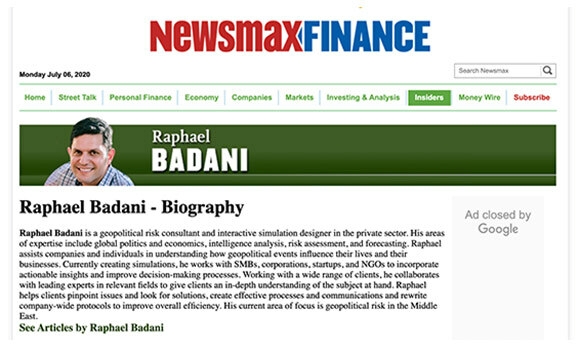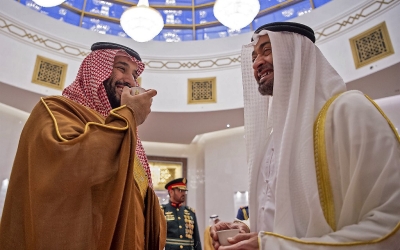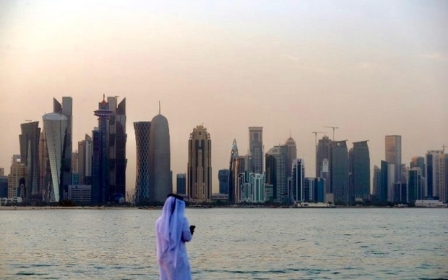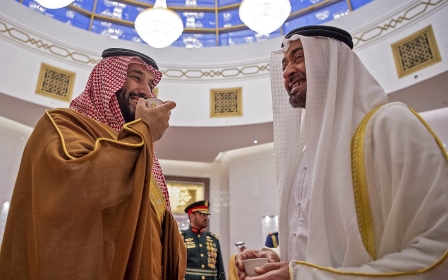Media sites hoodwinked by Middle East propaganda ruse using fake journalists

The placing of scores of opinion pieces about the Middle East in conservative media outlets by a mysterious network of supposed analysts who were actually fake journalists has been exposed by a US website.
The Daily Beast found that at least 19 fake personas had spent the last year placing nearly 100 articles in almost 50 different publications, including the Jerusalem Post and Al Arabiya.
The articles lauded the United Arab Emirates (UAE) and urged a tough line against Qatar, Turkey, Iran and its proxy groups in Iraq and Lebanon.
On Monday, Twitter suspended 16 accounts for violating the company’s “policies on platform manipulation and spam” after the Daily Beast shared the results of its probe into the network.
“Using technology, human review, and partnerships with researchers and other independent organizations studying these issues, we work to identify platform manipulation on our service and take action,” a Twitter spokesperson told the Daily Beast in a statement.
“As is standard, if we have reasonable evidence to attribute any activity to a state-backed information operation, we’ll disclose them - following thorough investigation - to our public archive.”
Marc Owen Jones, an assistant professor at Hamad Bin Khalifa University in Qatar, first noticed the suspicious posts by members of the network.
Speaking to Middle East Eye, Jones said: "There are real commentators who hold similar views, but perhaps not as many as some people might like, and certainly not commentators who can claim to be 'independent'.
"This operation is designed to give the illusion that a plurality and diverse array of commentators from across the world all have similar perspectives on Middle East politics.
"It's almost like the journalistic equivalent of astroturfing, done on a global scale."
'This op-ed has been removed'
One of the Twitter accounts closed down was attributed to a "Raphael Badani," whose biography on the US news and opinion website Newsmax describes him as currently specialising in "geopolitical risk in the Middle East".
In fact, his profile photos were stolen from the blog of a San Diego startup founder, while his LinkedIn profile falsely described him as a graduate of George Washington and Georgetown, the Daily Beast found.
Following the US website's investigation, the Washington Examiner removed an article authored by Badani last month, arguing that the IMF's bailout of Lebanon should be contingent on reducing Hezbollah's influence in the country.
In its place, the Examiner left an editor’s note saying: “This op-ed has been removed after an investigation into its provenance and authorship.”
Other outlets where articles that were critical of Qatar and supportive of tougher sanctions on Iran were placed included North American sites Human Events and The Post Millennial, and Asian newspapers such as the South China Morning Post.
AI-generated avatars
The personas in the network used a mixture of stolen or AI-generated avatars and fake biographies.
All of the stolen avatars were mirror-image reversed and cropped from their originals, making them difficult to find through common Google reverse image searches.
The personas identified by the Daily Beast were generally contributors to two linked sites, The Arab Eye and Persia Now.
The Arab Eye describes itself, ironically, as a bulwark against “‘Fake News’ and biased narrative” with a mission that “now more than ever it is crucial to hear opinions from the other side of the aisle on matters pertaining to the Middle East”.
Like the majority of their contributors, the sites themselves, which are hosted at the same IP address, appear to be fake.
One common trait of the fake personas was their praise of the UAE, including its “exemplary resilience” to the coronavirus pandemic, its “strong diplomatic ties” to the European Union, and supposed support of gender equality through the, now postponed, Expo 2020 in Dubai.
Jones said: "The perspectives issued by the fake journalists reflect a UAE-Saudi foreign policy (anti-Turkey, anti-Iran, anti-Qatar), suggesting that the operation is run by an entity connected to those countries.
"In terms of policy position, this is quite specific, making it a fairly high likelihood."
'The antithesis of good journalism'
Most recently, the network has focused on attacking Facebook over its decision to appoint Tawakkol Karman, a 2011 Nobel Peace Prize laureate and former member of the Muslim Brotherhood-affiliated Islah Party in Yemen, to its oversight board.
In articles for the Jewish News Service, Asia Times, Politicalite, and Middle East Online, the network described Karman as a “nefarious political actor with a questionable past” who will make Facebook the “platform of choice for extreme Islamist ideology”.
While none of the Twitter accounts connected to the network ever passed more than a few dozen followers, a few still managed to garner high profile endorsements for their writing.
An article by “Joyce Toledano” in Human Events about how Qatar is “destabilizing the Middle East” was lauded by Students for Trump co-founder Ryan Fournier’s nearly one million-follower Twitter account and French Senator Nathalie Goulet promoted "Lin Nguyen’s" broadside about Facebook and Karman.
Jones said: "Media outlets absolutely need to be more vigorous when screening for journalists.
"It is imperative that they are not just broadcasting propaganda written on behalf of opaque actors for the sake of generating content. This is the antithesis of good journalism."
This article is available in French on Middle East Eye French edition.
Middle East Eye delivers independent and unrivalled coverage and analysis of the Middle East, North Africa and beyond. To learn more about republishing this content and the associated fees, please fill out this form. More about MEE can be found here.






